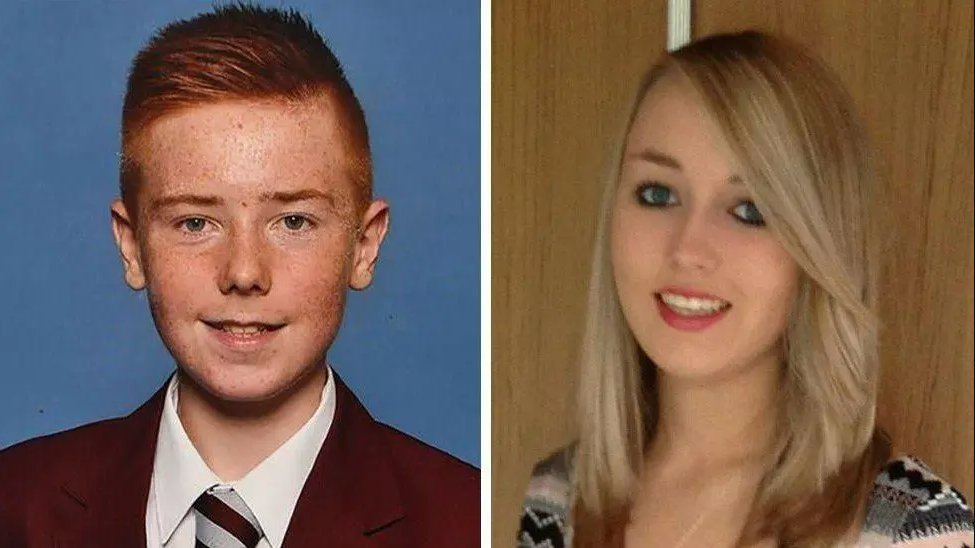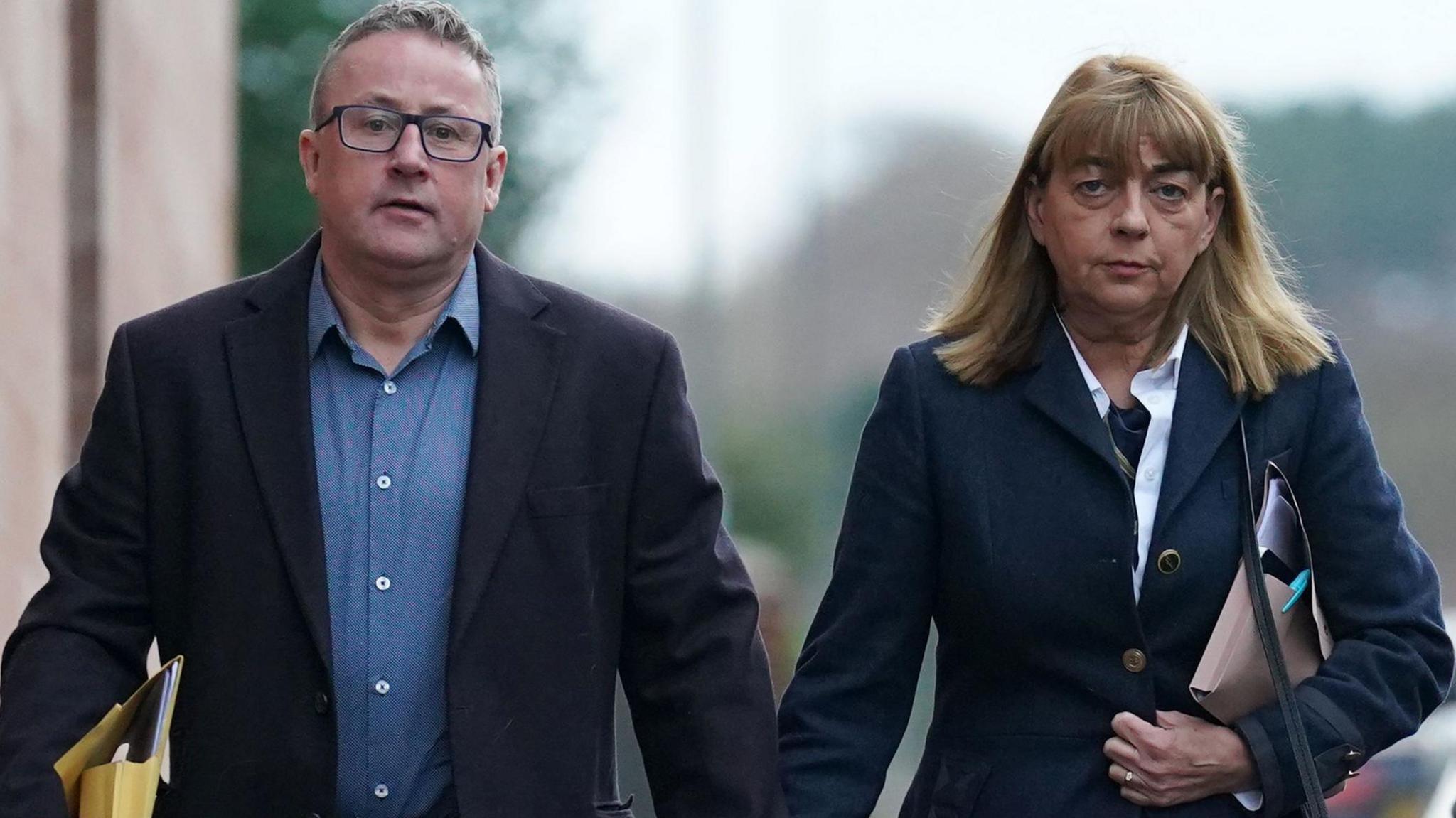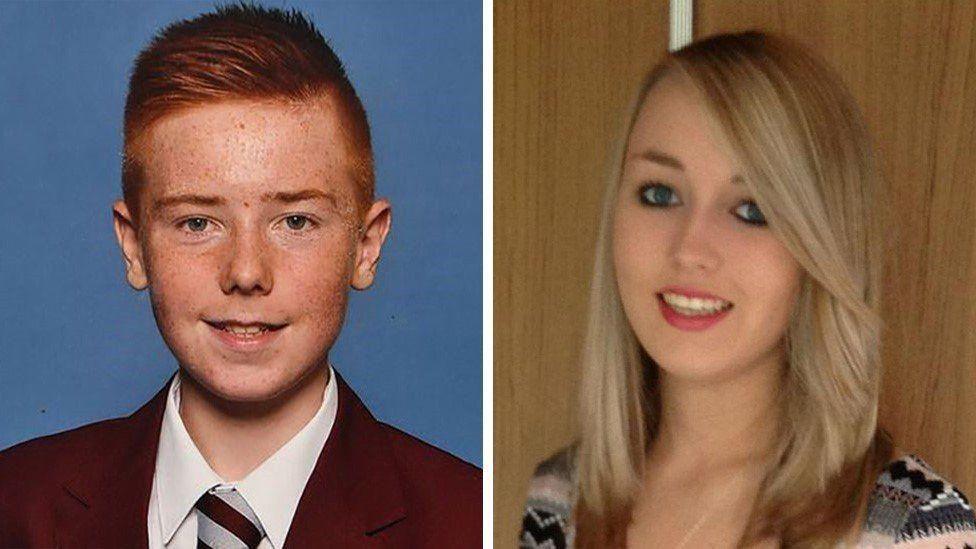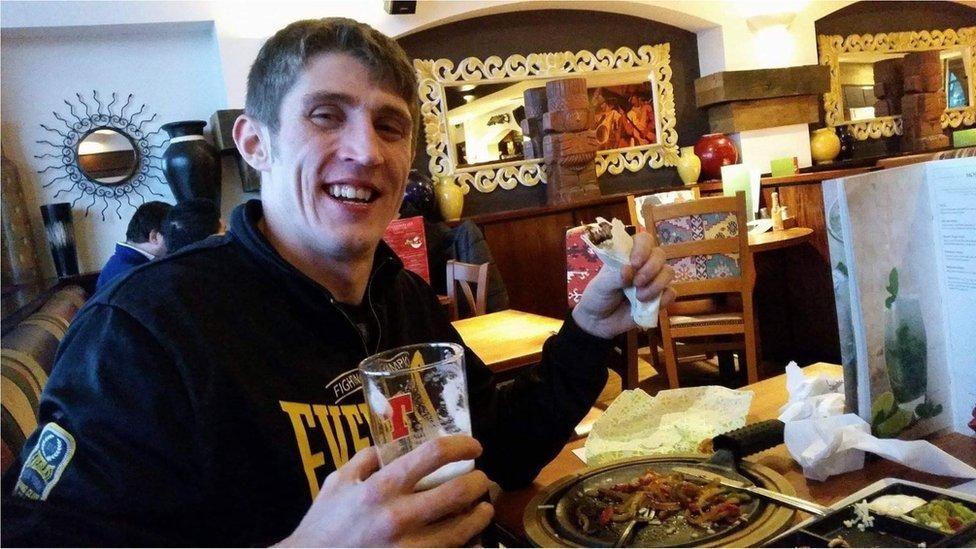Family backs bill to prosecute prisons for custody deaths

William Brown and Katie Allan took their own lives at Polmont Young Offenders Institution in 2018
- Published
The family of a woman who took her own life in a Scottish jail have backed an MP's bill which would allow prisons to be prosecuted for the deaths of inmates.
Labour MP Blair McDougall will present a ten minute rule bill, external to Westminster on Wednesday calling for Crown immunity in UK prison estates to be abolished.
Under current laws, the Crown, which includes the Scottish Prison Service (SPS), cannot be held criminally responsible for deaths in custody.
McDougall represents the constituency of Linda and Stuart Allan whose daughter Katie, 21, died in Polmont Young Offenders Institution in 2018.
Last year a fatal accident inquiry (FAI) found the deaths of Katie and William Brown,16 could have been avoided but for a "catalogue of failures" in the system.
Earlier, the Crown Office had found that a breach of the Health and Safety Act at the jail "materially contributed" to the deaths.
But it said the Scottish Prison Service (SPS) was protected by crown immunity.
Katie Allan was jailed for 16 months in March 2018 for causing serious injury by dangerous driving and driving over the alcohol limit.
William - also known as William Lindsay - had been remanded in custody after walking into Saracen Street police station in Glasgow while carrying a knife.
He only went to Polmont because a place could not be found for him in a secure children's unit.
The Scottish government accepted the findings of the FAI and said it had pursued a change in the law to scrap Crown immunity, but that it would require UK government approval.
'Profound responsibility'
Teresa Medhurst, head of the SPS, has also said it should face the possibility of prosecution over deaths in custody.
An SPS spokesperson said: "We recognise the profound responsibility we hold in caring for people during some of the most vulnerable periods of their lives.
"When someone dies in prison custody we know families, and the wider public, rightly expect us to do everything possible to prevent further tragedies.
"We are committed and determined to delivering systemic change, at pace, in a way which will be enduring, transparent, and impactful, and will save many lives in the future."
Crown Immunity has previously been scrapped for the NHS and police.
McDougall said the move would introduce accountability into the prison system.
The East Renfrewshire MP told BBC Scotland News: "I want to see Crown immunity lifted so that when there are failings in health and safety duties by prisons they are held to account for it.
"At the moment they are untouchable, they can fail again and again.
"People, particularly young prisoners, can lose their lives and there is no consequence for that."
If his private members' bill passes it will proceed to the next stage in the legislative process.

Katie's parents, Stuart and Linda Allan, have campaigned for change in the Scottish prison system
Katie Allan's mother, Linda, has been lobbying for change in the Scottish Prison Service since her daughter's death.
She approached McDougall, who is her local MP, at his first surgery after the general election last year to raise the issue and said he had been supportive ever since.
Ms Allan said: "We've always said justice for us would be the removal of Crown immunity. There's no meaning in losing a child but it would be a legacy for us.
"It means that in death Katie has done something good. That her death hasn't been meaningless.
"It means that perhaps her death might save the lives of other people in the future."
Ms Allan said it "sticks with her" that NHS Forth Valley could also not be prosecuted for any role they played in Katie's death - despite not having Crown immunity - as health care services were provided on the prison estate.
Similarly, she said if Katie had been in a private prison at the time of her death, a prosecution would have been be possible.
Ms Allan said the introduction of the bill was an important day for families who had lost loved ones to "preventable deaths" in prisons across the UK and would play a part in improving safety in jails.
She added: "If you look for example at the police service, when it lost Crown immunity, safety standards started to increase in terms of cell custody and police stations.
"So you would hope the same would happen across the prison estate."
What is Crown immunity?
Crown immunity is a legal principle which means that legislation does not normally apply to the state.
Effectively, it means the state, including government and official bodies such as the prison service - and sometimes its employees or agents - can be protected from being charged with criminal offences created by statute.
For example, if a person dies while in custody at a jail, the Crown could not be held criminally responsible for their death.
It does not shield them from civil liability, such as the case brought by the family of Allan Marshall, who died after being restrained by up to 17 prison officers at HMP Edinburgh in 2010.
Crown immunity was removed from the NHS over 30 years ago as part of the National Health Service and Community Care Act 1990.
It was introduced after a series of scandals, including a salmonella food poisoning outbreak in 1984 that contributed to the death of 19 patients.
In Scotland, Crown immunity may not always protect prison officers or officials.
For example, if they are caught using, possessing or giving a "personal communication device," such as a mobile phone, to a prisoner.
A provision of the Health and Safety at Work Act also states that, regardless of whether Crown immunity applies, an individual can be prosecuted if they cause a breach.
It also doesn't apply to privately managed jails, like HMP Addiewell which is the only prison in Scotland which is privately run.
Campaigners have long challenged the law, arguing that the public and private sectors do not operate on a level playing field.
- Published2 April

- Published17 January

- Published21 August 2024
